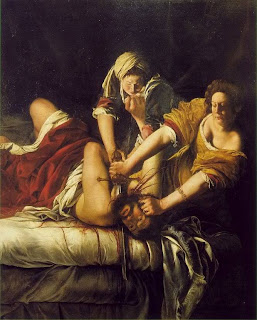by Kris Killen Olberding
(art aficionado, empowered female, and administrator at the Art Academy)
 Gentileschi was a highly accomplished early Baroque painter with the
rare distinction of being a female artist of the era who achieved a high
level of respect and fame. Born in Rome to a painter, Gentileschi
worked alongside her father in his workshop, and like
him, she was profoundly influenced by Caravaggio. Her work often
depicts strong, female protagonists from mythology or the Bible. This
particular work is gory and violent, telling the dramatic tale of the
widow Judith who sought revenge against Holofernes, the general who
besieged her town. Judith seduced him, got him drunk, and with the
assistance of her maid, decapitated him with his own sword, taking his
head as a trophy for her people. Caravaggio's influence can be seen in
the bold brushwork, vigorous action, rich hues, and dramatic play of
light illuminating the dark and horrifying moment that Judith attacks
Holofernes.
Gentileschi was a highly accomplished early Baroque painter with the
rare distinction of being a female artist of the era who achieved a high
level of respect and fame. Born in Rome to a painter, Gentileschi
worked alongside her father in his workshop, and like
him, she was profoundly influenced by Caravaggio. Her work often
depicts strong, female protagonists from mythology or the Bible. This
particular work is gory and violent, telling the dramatic tale of the
widow Judith who sought revenge against Holofernes, the general who
besieged her town. Judith seduced him, got him drunk, and with the
assistance of her maid, decapitated him with his own sword, taking his
head as a trophy for her people. Caravaggio's influence can be seen in
the bold brushwork, vigorous action, rich hues, and dramatic play of
light illuminating the dark and horrifying moment that Judith attacks
Holofernes.
Speculation abounds that Gentileschi was attempting to exorcise her own demons through such works of female empowerment, since she herself was famously the victim of rape at the hands of her art instructor. The lengthy trial that followed was very public, and the artist herself was openly tortured and interrogated during testimony. Amazingly, the court ruled in her favor, and her rapist was sentenced to one year in prison, which he never served. In an attempt to restore her virtue, Gentileschi’s father arranged a marriage for her in Florence, where the brash, young artist thrived, displaying tremendous skill at marketing herself and her work to the rich and famous, including the Medici family. To this day, she stands as a symbol of indomitable female spirit, and continues to hold her place in history as one of the boldest, most defiant, and progressive artists of her time. This painting resides in the Galleria degli Uffizi in Florence.
(art aficionado, empowered female, and administrator at the Art Academy)
Italian
Art in a Nutshell features a follower of Caravaggio, Artemisia
Gentileschi, and her masterpiece "Judith Slaying Holofernes,” 1618-20.
 Gentileschi was a highly accomplished early Baroque painter with the
rare distinction of being a female artist of the era who achieved a high
level of respect and fame. Born in Rome to a painter, Gentileschi
worked alongside her father in his workshop, and like
him, she was profoundly influenced by Caravaggio. Her work often
depicts strong, female protagonists from mythology or the Bible. This
particular work is gory and violent, telling the dramatic tale of the
widow Judith who sought revenge against Holofernes, the general who
besieged her town. Judith seduced him, got him drunk, and with the
assistance of her maid, decapitated him with his own sword, taking his
head as a trophy for her people. Caravaggio's influence can be seen in
the bold brushwork, vigorous action, rich hues, and dramatic play of
light illuminating the dark and horrifying moment that Judith attacks
Holofernes.
Gentileschi was a highly accomplished early Baroque painter with the
rare distinction of being a female artist of the era who achieved a high
level of respect and fame. Born in Rome to a painter, Gentileschi
worked alongside her father in his workshop, and like
him, she was profoundly influenced by Caravaggio. Her work often
depicts strong, female protagonists from mythology or the Bible. This
particular work is gory and violent, telling the dramatic tale of the
widow Judith who sought revenge against Holofernes, the general who
besieged her town. Judith seduced him, got him drunk, and with the
assistance of her maid, decapitated him with his own sword, taking his
head as a trophy for her people. Caravaggio's influence can be seen in
the bold brushwork, vigorous action, rich hues, and dramatic play of
light illuminating the dark and horrifying moment that Judith attacks
Holofernes. Speculation abounds that Gentileschi was attempting to exorcise her own demons through such works of female empowerment, since she herself was famously the victim of rape at the hands of her art instructor. The lengthy trial that followed was very public, and the artist herself was openly tortured and interrogated during testimony. Amazingly, the court ruled in her favor, and her rapist was sentenced to one year in prison, which he never served. In an attempt to restore her virtue, Gentileschi’s father arranged a marriage for her in Florence, where the brash, young artist thrived, displaying tremendous skill at marketing herself and her work to the rich and famous, including the Medici family. To this day, she stands as a symbol of indomitable female spirit, and continues to hold her place in history as one of the boldest, most defiant, and progressive artists of her time. This painting resides in the Galleria degli Uffizi in Florence.

No comments:
Post a Comment